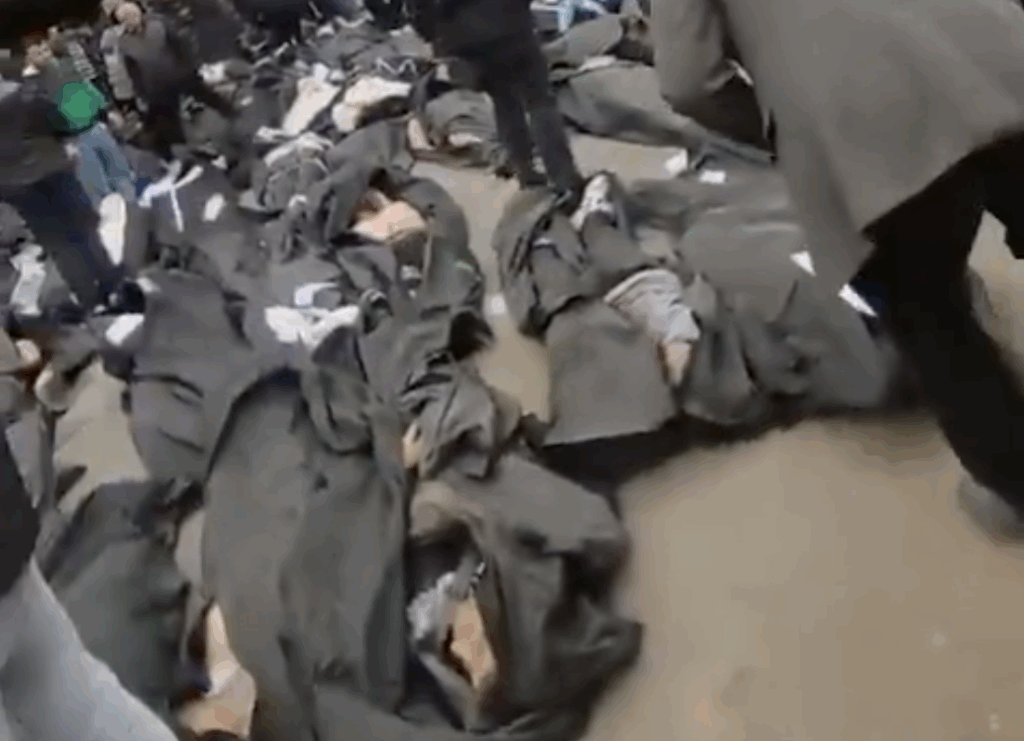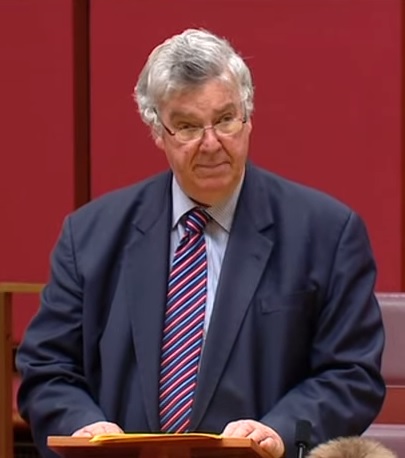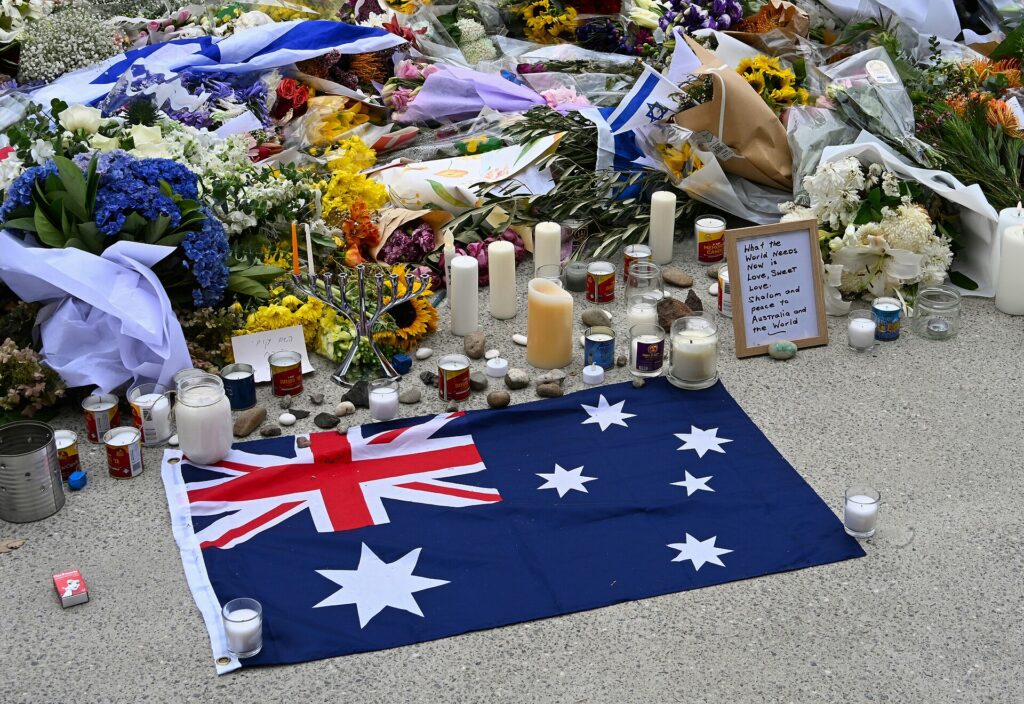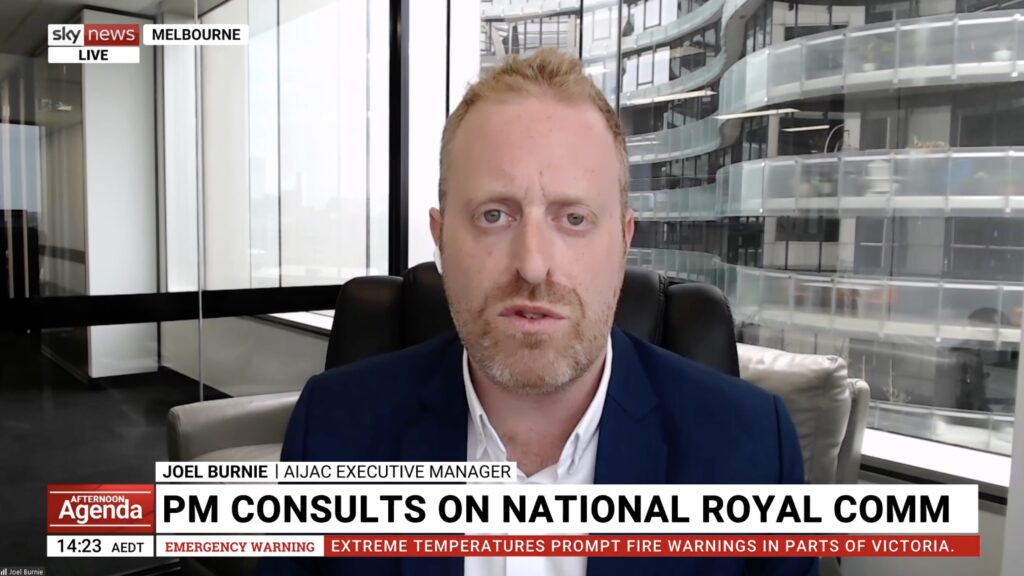UPDATES
Bin Laden’s death and its implications
May 5, 2011

Update from AIJAC
May 5, 2011
Number 05/11 #01
There is so much material being published on the killing of Osama bin Laden in Pakistan on Sunday by US forces that this Update will not attempt to duplicate the widely reported news (US President Obama’s announcement, for those who didn’t see it, is here.) Instead, it will focus on pieces providing an unusual perspective or analysing some under-reported elements and implications of this event.
First up is Barry Rubin who, in his usual insightful fashion, tries to place this event in some sort of historical context of the larger Islamist movement. Importantly, he argues that the Islamist movement extends way beyond the fate of al-Qaeda, and that other Islamist groups which are seeking to exploit state power – including Hamas, Hezbollah, and the Muslim Brotherhood in Egypt – may be even more important and more dangerous in the long run. He worries that the West may regard the fight over with this victory or further victories over al-Qaeda and thus allow other “bin Ladens” using different tactics to continue marching forward. For Rubin’s unique view, CLICK HERE. Other valuable “big picture” views of the significance of this event come from noted academic expert Fouad Ajami, thinktanker and former CIA analyst Reuel Marc Gerecht, Canadian academic Gil Troy, noted Israeli security journalist Ron Ben Yishai and foreign policy expert Walter Russell Mead.
Meanwhile, as widely noted, the killing of bin Laden in a Pakistani military town not far from the Pakistani capital raises serious questions about Pakistan’s role – and a unique perspective on the problem of Pakistan comes from noted novelist and news maker Salman Rushdie. He argues that the facts speak too loudly this time, and Pakistan’s traditional game of playing both sides will be difficult to hush up. He urges a tough approach to Pakistan to make it answer some very serious questions about its ongoing conduct vis-a-vis Afghanistan, the Taliban and al-Qaeda. For this original view from an important source, CLICK HERE. Some other interesting comment on the implications for Pakistan’s future role in the war on terror comes from the Washington Institute’s Simon Henderson and thinktanker and journalist Sadanand Dhume. Further material on the Pakistan angle is here and here.
Finally, the Jerusalem Post discusses a fact that has has not been widely reported in Australia, namely that Hamas condemned the killing of bin Laden, whom it praised as an “Arab holy warrior”. Hamas, of course, last week reached a deal with the Palestinian Authority (whose own response to the killing of bin Laden was much less controversial) which will see it brought into a unity government, leading some to demand Israel negotiate with Hamas, or at least cease objecting to its participation in the PA. The paper takes on the disconnect between people around the world who rejoice over bin Laden’s death, but at the same time demand Israel negotiate peace with a group that praises and supports him. For the paper’s complete argument, CLICK HERE. Other interesting comments on the Hamas reaction come from American thinktanker Jonathan Schanzer, Israeli blogger Omri Ceren and American writer Jonathan Toben. Also, Barry Rubin and Jackson Diehl of the Washington Post have more general discussions of the lessons to be drawn from the various groups, including the Egyptian Muslim Brotherhood, who praised bin Laden following his death.
Readers may also be interested in:
- Of course, it was not simply Hamas which praised bin Laden following his death, so did the Fatah-linked al-Aqsa Martyrs Brigade. Meanwhile, a preacher at Jerusalem’s al-Aqsa Mosque praised Osama as a “lion” killed by “dogs” and said US President Obama would be hanged for killing Muslims while a small pro-bin Laden demonstration occurred in east Jerusalem.
- A piece on Iran’s ambivalent response to the death of bin Laden.
- A useful timeline bringing together everything being reported about the intelligence work that led to the successful location of bin Laden. More on this from David Ignatius – who also highlights that intelligence retrieved from bin Laden’s compound may be at least as important as the killing of bin Laden.
- Meanwhile, the White House has been controversially repeatedly revising the details of its account of what happened at that compound – see here and here.
- Allegations that Wikileaks published a document last week that appears to have risked exposing the operation. American blogger Mickey Kaus asks if this could have affected the timing of the raid.
- Given that information from interrogations at Guantanamo Bay and secret CIA prisons reportedly supplied some of the intelligence that led to finding bin Laden, some comment on how this affects the debate about the need for such measures here, here and here.
- Additional authors making some good points or raising interesting questions about the implications of the killing include Jeffrey Goldberg (here and here), Max Boot, Shmuel Rosner, Joe Pappalardo, and Canadian Muslim leader Farzana Hassan.
- Two responses to the argument from some (including Australian Greens leader Bob Brown) that bin Laden’s death means it is time to withdraw from Afghanistan – here and here.
- Pieces pointing out that the killing of bin Laden was the same sort of “targeted assassination” that Israel has been previously broadly condemned for, from noted Law Professor Alan Dershowitz and noted American Mideast expert Michael Rubin.
- Michael Rubin also calls attention to a piece he wrote last year arguing such targeted assassinations are legal under international law. Legal academic Ilya Somin similarly argues that targeted assassination is often a more moral choice than the alternatives.
- Some interesting comment on how the killing of bin Laden fits in with the “Arab spring” turmoil roiling the region from Elliot Abrams and Amotz Asa-El. Meanwhile, an American academic discusses the low-key reaction to the Arab Spring on American campuses.
Bin Laden Is Dead and His Cause Goes Marching On
by Barry Rubin
Pajamas Media, May 2, 2011
Osama bin Laden is dead. But revolutionary Islamism is very much alive and stronger than ever. Thinking that bin Laden is the main problem and his death is the solution is very dangerous indeed and might well intensify the policies that have been leading toward the victory of his cause, though not his specific movement.
It is easy to forget that when bin Laden came on the scene revolutionary Islamism was in retreat. True, Iran was ruled by a revolutionary Islamist regime but that government had failed to extend the revolution overseas very much despite its best efforts. Another such regime, the Taliban, came to power in remote Afghanistan.
But by the end of the 1990s, revolutionary Islamism wasn’t doing so well. The reason was that its strategy was to overthrow Arab governments from within. There had been civil wars in Algeria, Egypt, Lebanon, and to a lesser extent in other places. The existing dictatorships, however, had repressed them.
So bin Laden came along with a different approach. If direct attacks on non-Islamist governments in Muslim-majority countries didn’t work, he proposed an international movement that would raise revolutionary enthusiasm by attacking the West.
One doesn’t have to isolate a single reason for this targeting. The West represented democracy and modernity, a licentious freedom and secularism that bin Laden and his comrades detested. They also hated Western policies, especially the support of Middle Eastern regimes to which these Islamists attributed their own inability to win.
While Israel was one of these countries, prior to September 11, bin Laden’s movement was more concerned about Saudi Arabia and Egypt. It also spoke a great deal about an alleged genocide in Iraq due to sanctions. And finally, it wanted to hit the West to show that it was a paper tiger and could be defeated. And an overarching factor was that the Islamists did not want the West to serve as role model for the future of their own societies though they feared that this was precisely what was happening.
So bin Laden formed al-Qaeda and took the road to September 11. It is important to understand that al-Qaeda failed as a movement but succeeded in the broadest sense as an idea. Since al-Qaeda was relatively small and eschewed political action and base building for the sole tactic of terrorism, it was relatively easy to repress, though not to eliminate entirely.
The U.S.-led attack on Afghanistan drove it from its home base and killed or captured many of its leaders. Al-Qaeda scattered but that was not such a great disadvantage given its strategy. From Morocco to Somalia, from Indonesia to Western Europe, it continued to stage scattered, but sometimes very bloody attacks. Yet that was the most it could do. In revolutionary terms, al-Qaeda was equivalent to the terrorists of late nineteenth century Europe, the assassins and bomb throwers of anarchism and Russian social revolutionary tradition.
Ah, but who, then, is the Lenin of our day? Just as the anarchist bomb-throwers were a sideshow — however horrific, bloody, and needing to be repressed— the same is true of today.
Al-Qaeda stages individual acts of terrorism. Hamas, Hizballah, the AKP in Turkey, and the Muslim Brotherhoods seize state power. And they do so with the help of Iran and Syria.
That’s power, that’s a threat far exceeding the blowing up of a café or embassy. To take control over the lives of millions of people, to hold assets amounting to billions of dollars, to rule over whole territories and launch full-scale wars, that is power. That is a threat to Western interests, to world stability.
What has happened since September 11, 2001? We can list the terrorist attacks by al-Qaeda and the casualties. And we can list the following not by al-Qaeda:
- An Islamist regime rules Turkey and has seized control of most institutions and is gradually crushing democracy. This regime has aligned itself with Hamas, Hizballah, Iran, and Syria.
- An Islamist regime rules the Gaza Strip and has already set off one war and will no doubt do so again. Its patrons are Iran, Syria, and now Egypt. This government now exercises veto power over any Israel-Palestinian peace which means there won’t be an Israel-Palestinian peace.
- An Islamist-oriented regime rules Lebanon, backed by Iran and Syria. It has already set off one war and will no doubt do so again.
- The Iranian regime has weathered a major internal upheaval and is heading full-speed ahead toward nuclear weapons.
- With Western help the regime in Egypt — one of the main bulwarks against revolutionary Islamism — has fallen, and whether or not Islamists there take over they will be a lot stronger, able to act freely, and direct a movement of millions seeking to Islamize and eventually make Islamist the largest Arab country of all.
- Revolutionary Islamism is also a serious threat, though so far has been kept at bay, in countries like Yemen, Iraq, Bahrain, Saudi Arabia, and Jordan while in other parts of the world it has spread to places like Chechnya, the northern Caucasus, the Balkans, Nigeria, Somalia, southern Thailand and the southern Philippines, and Indonesia. The resurgence of the Taliban in Afghanistan seems far from impossible, as does a revolutionary Islamist upheaval in Pakistan.
- Serious Islamist movements have gained political hegemony over growing Muslim communities all over the West. While many Muslims are indifferent to the movement and a few courageous dissidents combat it, Western governments and elites often blindly favor the Islamists.
- In fact, the degree that Western governments, elites, and societies are blind to the actual threat defies belief. The far left — which is a lot nearer than it used to be — often makes common cause with revolutionary Islamism.
Many of these other movements are “smarter” than bin Laden, which is to say they know how to be more tactically flexible. They can smile, and smile and be a villain. They understand far better how to be patient, conceal their plans, use elections, sponsor social services to win supporters, run youth camps to train suicide bombers, take Western aid and assistance, hang out with Western journalists to prove they’re cool guys, produce satellite television networks, and play Western democracies for all they are worth. Oh, and they can still throw bombs with the best of them.
Or, to put it in Iranian terms, bin Laden was the “little Satan,” and the “big Satan,” the real revolutionary Islamist movement, couldn’t care less about his death. Indeed, his death serves a useful purpose. If the West thinks the “war on terror” is over and it’s time to celebrate, all the better. Countries can go on trading with Iran, engaging Syria and Hizballah, and acting as if there’s no big threat in Egypt. All the better to eat you up.
So bin Laden is dead and September 11 is, in a sense, avenged. But his cause goes marching on. It is marching forward. And as the West cheers at the good news of bin Laden’s death it may go back to sleep thereafter, snoring as the bin Ladens of the world advance.
Back to Top
————————————————————————
Pakistan’s Deadly Game
by Salman Rushdie
Are we really supposed to believe that Pakistan didn’t know Osama bin Laden was living there for five years? Salman Rushdie on why it’s time to declare the country a terrorist state.
Osama bin Laden died on Walpurgisnacht, the night of black sabbaths and bonfires. Not an inappropriate night for the Chief Witch to fall off his broomstick and perish in a fierce firefight. One of the most common status updates on Facebook after the news broke was “Ding, Dong, the witch is dead,” and that spirit of Munchkin celebration was apparent in the faces of the crowds chanting “U-S-A!” last night outside the White House and at ground zero and elsewhere. Almost a decade after the horror of 9/11, the long manhunt had found its quarry, and Americans will be feeling less helpless this morning, and pleased at the message that his death sends: “Attack us and we will hunt you down, and you will not escape.”
Many of us didn’t believe in the image of bin Laden as a wandering Old Man of the Mountains, living on plants and insects in an inhospitable cave somewhere on the porous Pakistan-Afghan border. An extremely big man, 6-foot 4-inches tall in a country where the average male height is around 5-foot 8, wandering around unnoticed for ten years while half the satellites above the earth were looking for him? It didn’t make sense. Bin Laden was born filthy rich and died in a rich man’s house, which he had painstakingly built to the highest specifications. The U.S. administration confesses it was “shocked” by the elaborate nature of the compound.
We had heard—I certainly had, from more than one Pakistani journalist—that Mullah Omar was (is) being protected in a safe house run by the powerful and feared Pakistani Inter-Services Intelligence agency (ISI) somewhere in the vicinity of the city of Quetta in Baluchistan, and it seemed likely that bin Laden, too, would acquire a home of his own.
In the aftermath of the raid on Abbottabad, all the big questions need to be answered by Pakistan. The old flim-flam (“Who, us? We knew nothing!”) just isn’t going to wash, must not be allowed to wash by countries such as the United States that have persisted in treating Pakistan as an ally even though they have long known about the Pakistani double game—its support, for example, for the Haqqani network that has killed hundreds of Americans in Afghanistan.
This time the facts speak too loudly to be hushed up. Osama bin Laden, the world’s most wanted man, was found living at the end of a dirt road 800 yards from the Abbottabad military academy, Pakistan’s equivalent of West Point or Sandhurst, in a military cantonment where soldiers are on every street corner, just about 80 miles from the Pakistani capital Islamabad. This extremely large house had neither a telephone nor an Internet connection. And in spite of this we are supposed to believe that Pakistan didn’t know he was there, and that the Pakistani intelligence, and/or military, and/or civilian authorities did nothing to facilitate his presence in Abbottabad, while he ran al Qaeda, with couriers coming and going, for five years?
Pakistan’s neighbor India, badly wounded by the November 26, 2008, terrorist attacks on Mumbai, is already demanding answers. As far as the anti-Indian jihadist groups are concerned—Lashkar-e-Taiba, Jaish-e-Muhammad—Pakistan’s support for such groups, its willingness to provide them with safe havens, its encouragement of such groups as a means of waging a proxy war in Kashmir and, of course, in Mumbai—is established beyond all argument. In recent years these groups have been reaching out to the so-called Pakistani Taliban to form new networks of violence, and it is worth noting that the first threats of retaliation for bin Laden’s death have been made by the Pakistani Taliban, not by any al Qaeda spokesman.
India, as always Pakistan’s unhealthy obsession, is the reason for the double game. Pakistan is alarmed by the rising Indian influence in Afghanistan, and fears that an Afghanistan cleansed of the Taliban would be an Indian client state, thus sandwiching Pakistan between two hostile countries. The paranoia of Pakistan about India’s supposed dark machinations should never be underestimated.
For a long time now America has been tolerating the Pakistani double game in the knowledge that it needs Pakistani support in its Afghan enterprise, and in the hope that Pakistan’s leaders will understand that they are miscalculating badly, that the jihadists want their jobs. Pakistan, with its nuclear weapons, is a far greater prize than poor Afghanistan, and the generals and spymasters who are playing al Qaeda’s game today may, if the worst were to happen, become the extremists’ victims tomorrow.
There is not very much evidence that the Pakistani power elite is likely to come to its senses any time soon. Osama bin Laden’s compound provides further proof of Pakistan’s dangerous folly.
As the world braces for the terrorists’ response to the death of their leader, it should also demand that Pakistan give satisfactory answers to the very tough questions it must now be asked. If it does not provide those answers, perhaps the time has come to declare it a terrorist state and expel it from the comity of nations.
Salman Rushdie is the author of eleven novels—Grimus, Midnight’s Children (for which he won the Booker Prize and, recently, the Booker of all Bookers), Shame, The Satanic Verses, Haroun and the Sea of Stories, The Moor’s Last Sigh, The Ground Beneath Her Feet, Fury, Shalimar the Clown, The Enchantress of Florence, and Luka and the Fire of Life—and one collection of short stories, East, West. He has also published three works of nonfiction—The Jaguar Smile, Imaginary Homelands: Essays and Criticism 1981-1991, and Step Across This Line—and co-edited two anthologies, Mirrorwork and Best American Short Stories 2008. He is a former president of American PEN.
Back to Top
————————————————————————
Loathing bin Laden, indulging Hamas
JERUSALEM POST EDITORIAL
02/05/2011 23:30
To Haniyeh and other Hamas leaders, bin Laden is a martyr and his killers are criminals; And the Gaza “prime minister” has no compunction about saying so.
Almost a decade after 9/11 – the most deadly terror attack ever perpetrated on American soil – the head of the organization responsible for the death and devastation is no longer. Despite the late hour at which the announcement was made by President Barack Obama Sunday, thousands of jubilant Americans spontaneously flooded Times Square in New York City and gathered in front of the White House in Washington DC, cheering “U-S-A!” until dawn.
Internationally, too, many reactions were ecstatic. German Chancellor Angela Merkel told Obama that “Osama bin Laden was responsible for the deaths of thousands of innocent people… The forces of peace were successful last night.” But she warned, “International terror has not been defeated… We’ll all have to remain vigilant.” British Prime Minister David Cameron said that the death of bin Laden would bring “great relief” across the world.
Even Mahmoud Abbas’s Palestinian Authority reacted positively. “Getting rid of bin Laden is good for the cause of peace worldwide, but what counts is to overcome the discourse and the methods – the violent methods – that were created and encouraged by bin Laden and others in the world,” PA spokesman Ghassan Khatib said.
Inexplicably, however, while it is clear to most people that the downfall of a mastermind of terrorism is a cause for celebration, similar common sense is not being universally applied to the rise of another terrorist force, Hamas. Some of the same leaders and opinion-shapers who have rushed to hail the killing of bin Laden, indeed, are indulging Abbas as he prepares, on Wednesday, to enter a reconciliation deal with a terrorist organization that shares many of the same goals and ideological roots as bin Laden and has competed with him in the indiscriminate killing of civilians.
EU foreign policy chief Catherine Ashton, UN Secretary- General Ban Ki-moon, the leaders of Russia – all represented in the Mideast Quartet – have issued public statements indicating support or tolerance for the burgeoning unity between Fatah, a party which welcomed the demise of bin Laden, and Hamas, which did not. Even the US administration, now rightly reaping international congratulation for finally stopping bin Laden, is purporting to believe that Fatah’s alliance with the Israel-loathing Hamas might somehow serve the cause of peace.
TELLINGLY, FOR Ismail Haniyeh, head of the Hamas administration in the Gaza Strip, bin Laden’s elimination is a cause for mourning and protest. To Haniyeh and other Hamas leaders, bin Laden is a martyr and his killers are criminals. And the Gaza “prime minister” has no compunction about saying so.
“We condemn the assassination [of bin Laden] and the killing of an Arab holy warrior,” Haniyeh said during a press conference on Monday. “We regard this as a continuation of the American policy based on oppression and the shedding of Muslim and Arab blood.”
Haniyeh’s response is no surprise. Besides differences over the merits of al-Qaida’s global jihad campaign, as opposed to Hamas’s more localized activities primarily targeting Israelis, the two Islamist terror organizations share an ideology of violence in the name of a perverted interpretation of divine will.
Both bin Laden’s al-Qaida and Hamas, an offshoot of the Muslim Brotherhood, were profoundly influenced by radical Egyptian theologian Sayyid Qutb. Both adhere to the belief in the need for a violent jihad to right supposed injustices perpetrated in the Mideast against Muslims, particularly by the US and Israel but sometimes by other non-Muslim states. Both also assert that civilians, including women and children, are legitimate targets. Both are profoundly anti-Semitic, and regularly warn against alleged Jewish conspiracies.
(Bizarrely, Hamas claims in its official charter that Jews exercise international influence through such benign organizations as the Rotary Club and the Lions Club.) And yet, while the international community had long since internalized that a world without bin Laden is a better place in which to live, the potential resurgence of Hamas as the dominant political leadership of the Palestinian people, not just in Gaza but in the West Bank as well, is being met with equanimity at best.
Hamas’s predictably despicable reaction to bin Laden’s death is yet another reminder to those countries that value freedom and denounce terrorism that the global terror chieftan and the Palestinian terrorist movement fall into the same category.
How ironic and how tragic that, even as millions in nations around the world spontaneously celebrate the death of one of history’s most evil terror masterminds, another toxic terrorist network is being afforded growing legitimacy in some of the very same nations.
Tags: Afghanistan/ Pakistan, Indonesia





